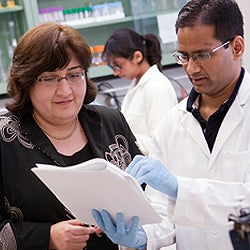With her expertise in drug development, Pharmacy Professor Fatemeh Akhlaghi’s work has the potential to not only touch millions of lives, but to change them for the better. The National Institutes of Health (NIH) has granted her $1.65 million to research a new treatment for alcoholism, which affects an estimated 140 million people globally.
The grant formalizes a URI partnership with Dr. Lorenzo Leggio, chief of the Section on Clinical Psychoneuroendocrinology and Neuropsychopharmacology at the National Institute on Alcohol Abuse and Alcoholism and the National Institute on Drug Abuse, and Pfizer, the world’s largest research-based pharmaceutical company.
Professor Akhlaghi and Leggio are focusing on the aminoacid peptide ghrelin, which stimulates appetite and food intake. In alcoholics, higher concentrations of ghrelin are associated with higher alcohol craving and consumption. They believe that an oral medication that targets ghrelin and can pass through the blood-brain barrier holds promise for treatment.
“If we can stop food cravings, then maybe we can stop alcohol cravings,” Professor Akhlaghi said. “Simply put, URI is helping NIH develop a new treatment for alcoholism.”
Leggio specifically sought out Professor Akhlaghi for this project because of her expertise in pharmacokinetics, which studies a medicine’s effects on the body, and pharmacodynamics, which focuses on how the body’s biological processes affect medication. “I look at timing, the course of a drug in the body, the drug concentration, and how all of those relate to the drug’s effectiveness,” she said.
Professor Akhlaghi and Leggio were one of only nine teams in the country to win such an award from the NIH. In addition to this project, Professor Akhlaghi’s resesarch has focused on many other areas that could improve millions of lives, including diabetes and anti-rejection drugs taken by transplant patients.

